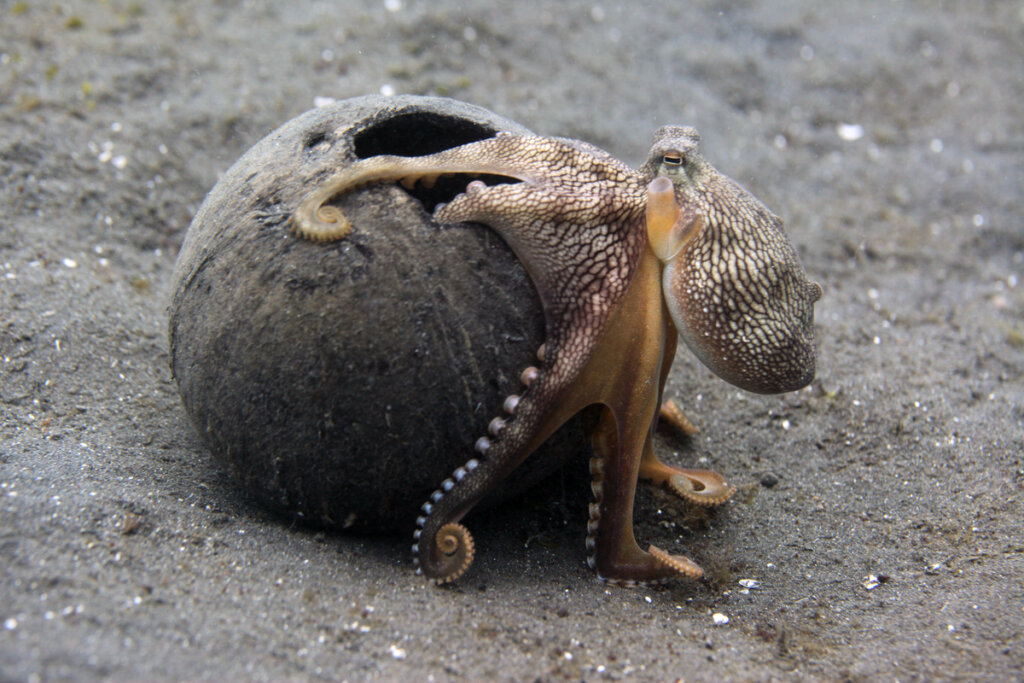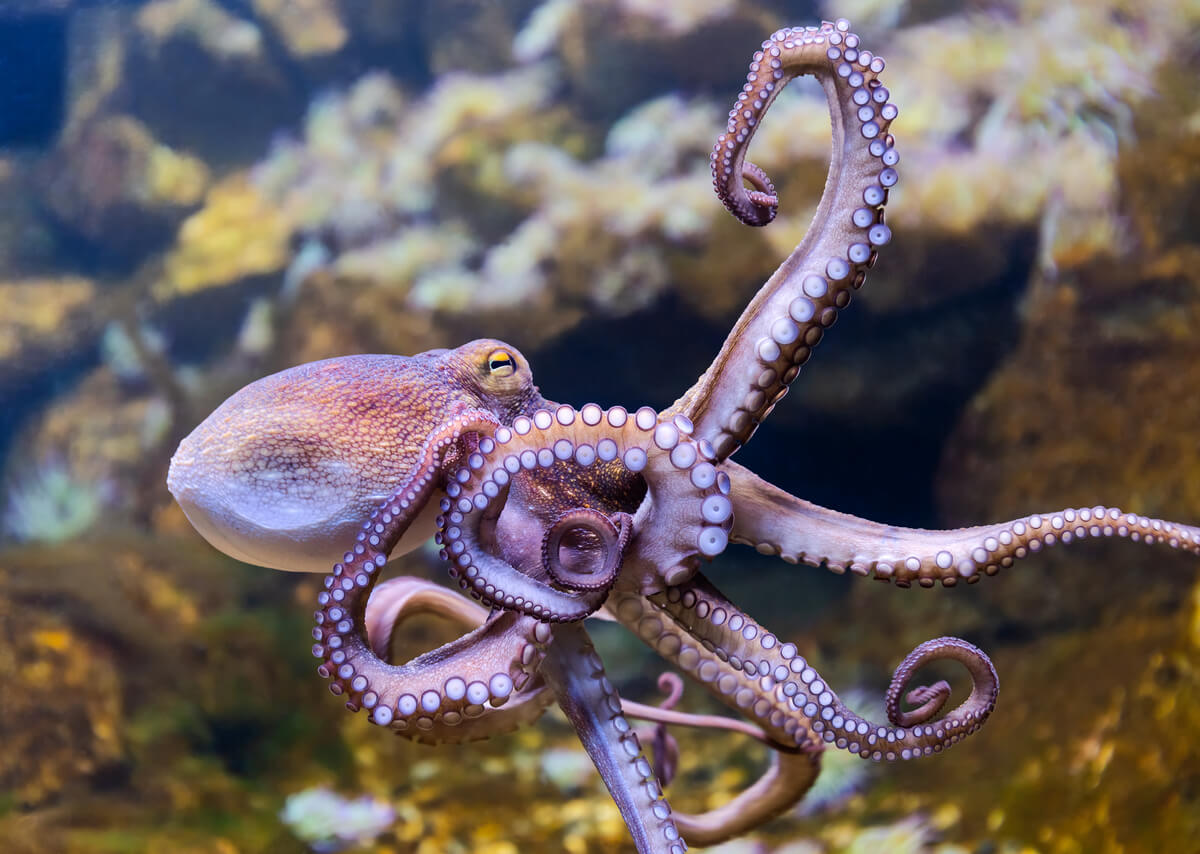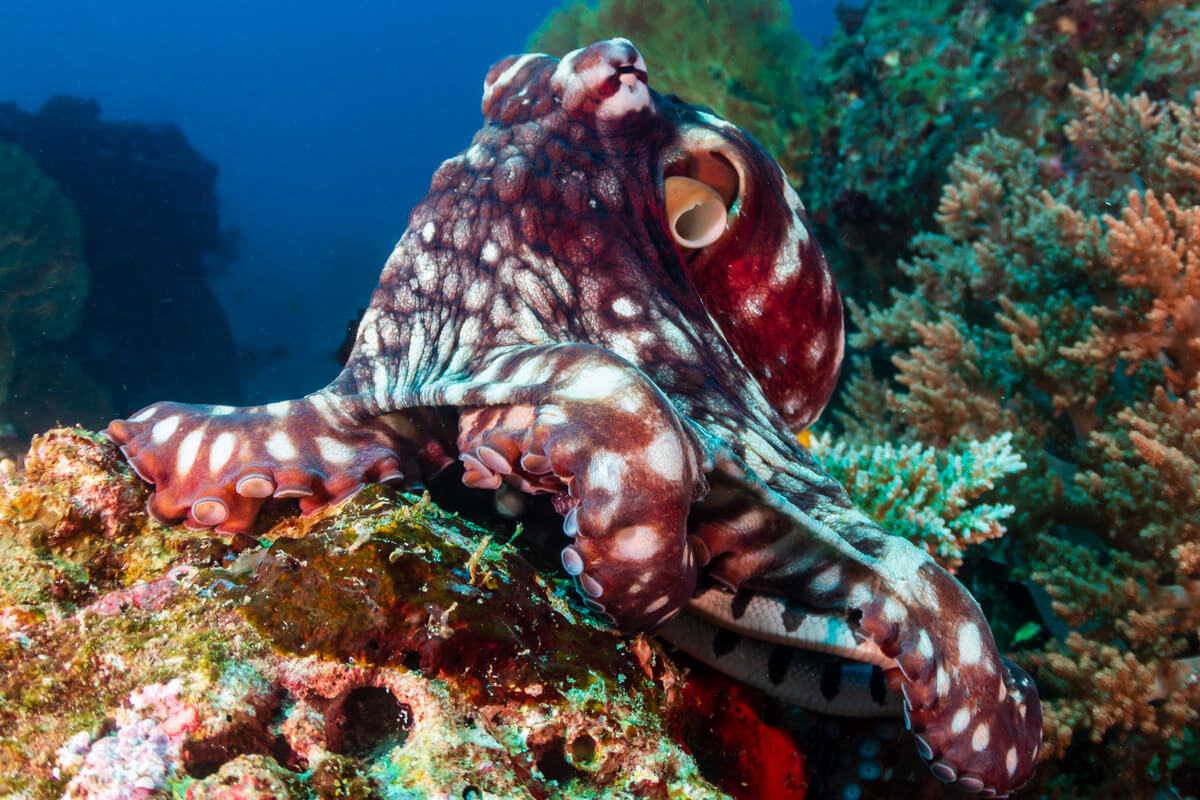Octopus Intelligence Put to the Test!

Since the appearance of the world-famous Paul the octopus – a cephalopod that was used to predict the results of the German national team in the 2010 World Cup – octopus intelligence has become a real talking point.
Even so, etiology doesn’t base animal intelligence on beliefs or viral videos. If something is to be demonstrated, it’s necessary to do so under strict conditions and controllable parameters. Discover here with us how octopus intelligence has been tested by experts in various experiments.
The curious world of octopus intelligence
Before we dive into the world of octopus intelligence, and to give you an idea of how peculiar octopuses are, here are a few fascinating facts about them:
- Its central nervous system isn’t only located in its head; this animal has a large group of neurons in each tentacle, possessing a certain autonomy and decision-making capacity. With their tentacles, octopuses can also smell and taste what they touch.
- These animals can move the suction cups of their tentacles individually, just as we can move our fingers. They usually have about 1600 suckers in total.
- They can modify their DNA at will to adapt to new situations.
- They get bored easily and, in captivity, they must be provided with a lot of environmental enrichment so that they don’t develop behavioral disorders.
- Octopuses can modify the color spectrum of their vision to adapt to the depth at which they swim. This answers the question of how they know what color to camouflage themselves, as they’re actually color-blind.

The intelligence of their tentacles
Most land animals are characterized by having a central nervous system, with which they sense the environment and send movement orders to the body. However, octopuses don’t rely on this mechanism to move their tentacles. In most cases, as we touched on above, their brain doesn’t receive signals from their limbs, but the limbs themselves interpret the situation and act accordingly.
Octopuses have about 500 million neurons, two thirds of which are distributed along their body (tentacles). This means that a large part of their nervous system is diffused and doesn’t centralize its operations in the brain. It’s thanks to this that their limbs are able to “make their own decisions”.
Formally, an octopus’s nervous system comprises small “control centers” in each tentacle. This organization is called ganglia, and each is connected to the others, so that they can coordinate as a whole. This doesn’t mean that each limb has a mind of its own, but that the octopus “brain” is divided into parts to make decision-making more efficient.
An octopus’s limbs have the capacity to work individually and at the same time. That is, they can perform at least 8 different tasks without harming the organism. In the same way, they could unite their processing capacity to solve the same problem, which is believed to be part of the answer to why they’re so intelligent.
How is octopus intelligence tested?
Although some researchers have done experiments in captivity, most studies with octopuses come from observing them in their habitat. Here are some examples of particular relevance.
The octopus that broke the experiment
On various websites, you can see a video in which an octopus is challenged to take a prize from inside a feeding bottle. The aim of the experiment was for the animal to unscrew the lid, as octopuses have been shown to be capable of doing.
Even so, this specimen gave the solution one more twist: it managed to push the teat into the bottle, which allowed it to finally reach its prize. Experts still don’t know how it managed to apply the necessary pressure, as they themselves were unable to achieve what the octopus had done.
Often, the behavior of octopuses in captivity is more surprising than the experiments themselves. Here are some examples:
- Octopuses are aware that they’re trapped and try to escape: Inky, an octopus that escaped from the New Zealand National Aquarium, slipped through a crack and crawled into a pipe leading to the Pacific Ocean. He was never seen again.
- They distinguish between their keepers and have preferences: In a laboratory in New Zealand, one of the octopuses seemed to have a grudge against one of its keepers, at whom it ejected jets of water every time it passed by.
- They modify their environment: Accustomed to low underwater luminosity, they don’t like the strong lights of aquariums. Two octopuses forced their release by shooting jets of water at the fluorescent lights to extinguish them due to a short circuit. When the expense of repairs no longer paid off, these animals were released.
The ecological intelligence of octopuses
The ecological intelligence hypothesis postulates that certain animal species have developed their intelligence based on the difficulty of finding food.
While some species have food available almost all year round -such as grazing herbivores- other animals must know where to look for it and when it ripens, such as frugivores. Some animal species make plans for the future based on this knowledge.
Scientist Piero Amodio claims that, due to the loss of their shells millions of years ago, the difficulty in finding food and shelter tested octopus intelligence, forcing them to be much more creative in order to survive.
Other octopus abilities
As a final note, here are some of the discoveries that have been made by observing octopuses in the wild:
- They’re capable of using tools: Researcher Finn and his team recorded octopuses using empty shells or even a coconut shell to hide from predators or hunt passing prey.
- They think ahead: These animals didn’t only hide in shells or coconuts, but when they came out of the hiding place, they took it with them to use it later.
- They have a good memory: Octopuses remember places where they have felt safe and return to where food is plentiful.
- They’re skilled hunters: They can cooperate with other species to capture the same prey or develop tools to catch them. They also remember the weak points of their victims and how they can defend themselves, which helps them avoid injury.
- They can learn just by watching other octopuses: If they observe that a fellow octopus benefits from a particular action, they’re able to imitate it. However, they don’t copy all the movements they observe, but are able to copy the ones that could be advantageous depending on the situation they’re facing.

As you can see, octopus intelligence has been put to the test on multiple occasions with fascinating results. Undoubtedly, these charismatic cephalopods will never cease to amaze us.
All cited sources were thoroughly reviewed by our team to ensure their quality, reliability, currency, and validity. The bibliography of this article was considered reliable and of academic or scientific accuracy.
- Finn, J. K., Tregenza, T., & Norman, M. D. (2009). Defensive tool use in a coconut-carrying octopus. Current biology, 19(23), R1069-R1070.
- Inky, el pulpo que escapó por una tubería de un acuario y volvió al mar, BBC Mundo. Recogido a 9 de noviembre en https://www.bbc.com/mundo/noticias/2016/04/160413_ciencia_nueva_zelanda_acuario_pulpo_inky_escape_ppb#:~:text=Inky%2C%20un%20pulpo%20que%20viv%C3%ADa,cuidadores%20y%20volvi%C3%B3%20al%20mar.&text=El%20pulpo%20pudo%20recuperar%20su,de%20unos%20trabajos%20de%20mantenimiento.
- Sivitilli, D. M., & Gire, D. H. (2019, June). Collective cognition in the arms of the octopus. In 2019 Astrobiology Science Conference. AGU.
- Mather, J. A., & Kuba, M. J. (2013). The cephalopod specialties: complex nervous system, learning, and cognition. Canadian Journal of Zoology, 91(6), 431-449.
- Sampaio, E., Seco, M. C., Rosa, R., & Gingins, S. (2021). Octopuses punch fishes during collaborative interspecific hunting events. Ecology, 102(3).
- Fiorito, G., & Scotto, P. (1992). Observational learning in Octopus vulgaris. Science, 256(5056), 545-547.